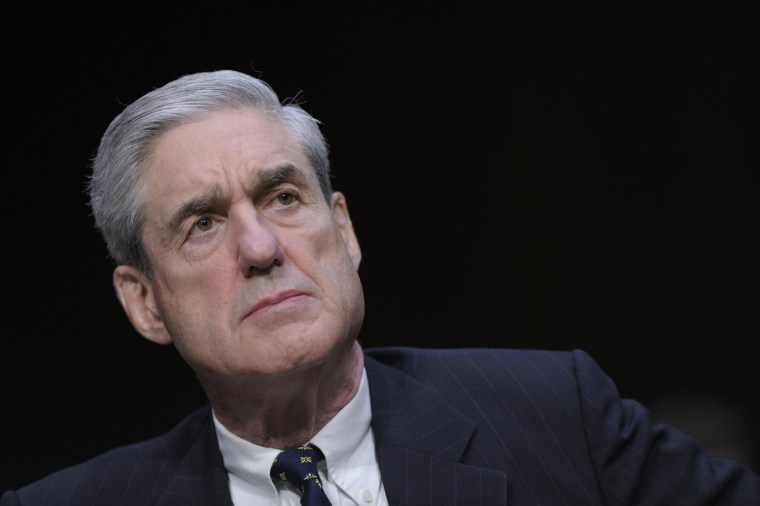The decision to appoint a special counsel to oversee the investigation into alleged Russian interference with the 2016 presidential election answered demands from some Democrats — but the appointment is not completely independent.
The order to appoint former FBI director Robert Mueller was signed by Deputy Attorney General Rod Rosenstein Wednesday. Rosenstein said it was in the public interest to appoint a special counsel, and that counsel would assume responsibility for overseeing the investigation.
Mueller will have full authority to investigate and file criminal charges if warranted, the same way a U.S. attorney would.
"I accept this responsibility and will discharge it to the best of my ability,” Mueller said in a statement. He also resigned from his private law firm.
According to a Congressional Research Service report, the attorney general — or in this case, Rosenstein, since Attorney General Jeff Sessions has recused himself — must be notified of any specific actions the special counsel intends to take, and has the ability to countermand those proposed actions.
Modern special counsels have less independence than the special prosecutors employed during the Watergate investigations of the 1970s, who were appointed under a law that has now expired.
Related: Who is Robert Mueller? Special Counsel Hailed by Both Parties
The last special counsel was Patrick Fitzgerald, who was tapped in 2003 to investigate the leaking of a CIA operative's name.
Congress in 1978 passed a law in the wake of Watergate that allowed the appointment of "independent counsel" by a three-judge panel of a Washington, D.C. appeals court at the request of the attorney general, but the law had five-year sunset provisions and was ultimately allowed to expire in 1999, according to the Congressional Research Service.
Former Congresswoman Elizabeth Holtzman, who authored the bill, wrote on CNN last week that law "set up a virtually automatic mechanism for a court-appointed special prosecutor."
After that law expired, new regulations allowed for the appointment of "special counsels" but those are answerable to the U.S. attorney general.
"The 'special counsels' under these regulations have, therefore, by express design, less 'independence' from the attorney general and the Department of Justice than did the 'independent counsels' under the Ethics in Government Act of 1978, or the 'special prosecutors' appointed by the attorney general for the Watergate matter," the CRS wrote in a 2013 report.
When now-fired FBI Director James Comey as acting attorney general in 2003 appointed Fitzgerald as special counsel to investigate the leaking of the CIA operative’s name, Comey gave Fitzgerald more authority than under the regulations after the independent counsel law expired in 1999, the research office said.
Comey directed Fitzgerald "to exercise that authority as Special Counsel independent of the supervision or control of any officer of the Department."
He later clarified in a further letter to Fitzpatrick in February of 2004 that he was granting plenary power, or complete control over the investigation.
Rosenstein’s letter appointing Mueller as special counsel does not have similar language about independence or plenary power, but Rosenstein said in a statement that he was putting the investigation “under the authority of a person who exercises a degree of independence from the normal chain of command.”
The 1978 law wasn’t continually in effect through 1999. It was allowed to expire in 1992, but was reauthorized in 1994 over concerns about the Whitewater scandal. Attorney General Janet Reno had already appointed under her own authority a "special counsel" with powers similar under the prior law, according to the Congressional Research Service, but once the law was renewed she asked a panel of judges to reappoint the special counsel in the investigation.
Related: Flynn, Manafort Are Key Figures in Russia Probe Mueller Will Lead
Rosenstein's letter directs "an investigation into any links and/or coordination between the Russian government and individuals associated with the campaign of President Donald Trump" and also "any matters that arose or may arise directly from the investigation."
Rosenstein's letter also authorizes criminal charges if warranted. If Mueller wanted to expand the investigation outside the terms outlined in the letter, for example, he would have to go to Rosenstein.
Rosenstein said in the statement that "Special Counsel Mueller will have all appropriate resources to conduct a thorough and complete investigation, and I am confident that he will follow the facts, apply the law and reach a just result."
Former Attorney General Eric Holder said in a statement on Wednesday that "as long as his character is appropriately defined and he is properly resourced, this is a good move."
Trump said in a statement that "As I have stated many times, a thorough investigation will confirm what we already know — there was no collusion between my campaign and any foreign entity."
"I look forward to this matter concluding quickly," Trump said. "In the meantime, I will never stop fighting for the people and the issues that matter most to the future of our country."

